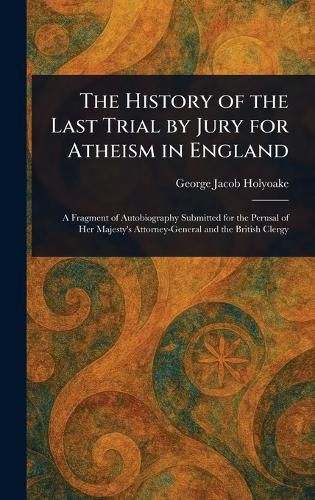Readings Newsletter
Become a Readings Member to make your shopping experience even easier.
Sign in or sign up for free!
You’re not far away from qualifying for FREE standard shipping within Australia
You’ve qualified for FREE standard shipping within Australia
The cart is loading…






This title is printed to order. This book may have been self-published. If so, we cannot guarantee the quality of the content. In the main most books will have gone through the editing process however some may not. We therefore suggest that you be aware of this before ordering this book. If in doubt check either the author or publisher’s details as we are unable to accept any returns unless they are faulty. Please contact us if you have any questions.
"History Of The Last Trial By Jury For Atheism In England: A Fragment of Autobiography Submitted for the Perusal of Her Majesty's Attorney-General and the British Clergy" by George Jacob Holyoake, offers a compelling glimpse into a pivotal moment in the fight for religious freedom. This historical account details the last trial by jury in England centered around atheism, providing a unique and personal perspective on the challenges faced by those who dared to question religious dogma.
Holyoake's narrative, presented as a fragment of his autobiography, vividly portrays the social and legal landscape of the time. It offers insights into the attitudes towards atheism and the workings of the English justice system, particularly the concept of trial by jury, within the context of religious belief. This book is a valuable resource for anyone interested in the history of atheism, the struggle for religious tolerance in England, or the intersection of religion and science. It remains a significant testament to the enduring importance of intellectual and religious liberty.
This work has been selected by scholars as being culturally important, and is part of the knowledge base of civilization as we know it.
This work is in the public domain in the United States of America, and possibly other nations. Within the United States, you may freely copy and distribute this work, as no entity (individual or corporate) has a copyright on the body of the work.
Scholars believe, and we concur, that this work is important enough to be preserved, reproduced, and made generally available to the public. We appreciate your support of the preservation process, and thank you for being an important part of keeping this knowledge alive and relevant.
$9.00 standard shipping within Australia
FREE standard shipping within Australia for orders over $100.00
Express & International shipping calculated at checkout
This title is printed to order. This book may have been self-published. If so, we cannot guarantee the quality of the content. In the main most books will have gone through the editing process however some may not. We therefore suggest that you be aware of this before ordering this book. If in doubt check either the author or publisher’s details as we are unable to accept any returns unless they are faulty. Please contact us if you have any questions.
"History Of The Last Trial By Jury For Atheism In England: A Fragment of Autobiography Submitted for the Perusal of Her Majesty's Attorney-General and the British Clergy" by George Jacob Holyoake, offers a compelling glimpse into a pivotal moment in the fight for religious freedom. This historical account details the last trial by jury in England centered around atheism, providing a unique and personal perspective on the challenges faced by those who dared to question religious dogma.
Holyoake's narrative, presented as a fragment of his autobiography, vividly portrays the social and legal landscape of the time. It offers insights into the attitudes towards atheism and the workings of the English justice system, particularly the concept of trial by jury, within the context of religious belief. This book is a valuable resource for anyone interested in the history of atheism, the struggle for religious tolerance in England, or the intersection of religion and science. It remains a significant testament to the enduring importance of intellectual and religious liberty.
This work has been selected by scholars as being culturally important, and is part of the knowledge base of civilization as we know it.
This work is in the public domain in the United States of America, and possibly other nations. Within the United States, you may freely copy and distribute this work, as no entity (individual or corporate) has a copyright on the body of the work.
Scholars believe, and we concur, that this work is important enough to be preserved, reproduced, and made generally available to the public. We appreciate your support of the preservation process, and thank you for being an important part of keeping this knowledge alive and relevant.